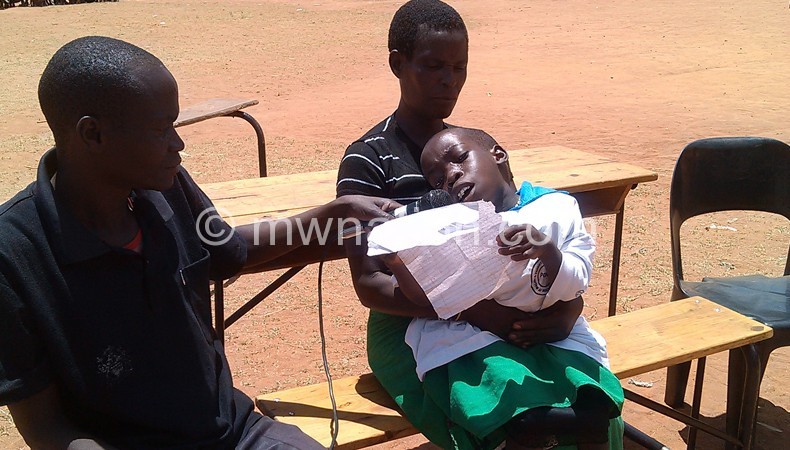Defying disability odds; the story of Lekeleni
She was a regular sight at Lilongwe Bridge where she used to squat on a wrapper with her arms stretched out as she begged from passers-by.
But after years of enduring harsh scorching summer heats, biting winters, hailstorms, insults and abuses that characterise street life, coupled with the tragic death of her father, Lekeleni Lyson was forced out of the streets.

“After my father’s death, my mother, who used to take me to the streets to beg, decided it was time for the family to return to our home village of Mtsukwa in Traditional Authority [T/A] Mkanda in Mchinji.,” explains Lekeleni.
At 18, Lekeleni does not look her age due to a rare neurological condition that has retarded her intellectual and physical development, such that one would easily mistake her for a six-year-old.
She says: “I cannot use my legs and although I can use my hands, they are deformed. Before returning to the village, we used to live in Likuni and I was enrolled in school. However, due to poverty my mother thought she could use my condition to generate extra money for the household through street begging.
“On the streets, I was regularly subjected to abuse. Life was hard and this made it difficult for me to focus on my education,” says Lekeleni, who is repeating Standard Eight at Kaseka Primary School, having fared badly during the 2013/14 Primary School Leaving Certificate of Education (PSLCE).
Last year, she sat her PSLCE examinations at Chiwenga Primary School in Likuni.
“I only managed to get a grade D in mathematics and failed the rest of the subjects. My favourite subject is English and my ambition is to become a secretary. I don’t fancy street life again because it is retrogressive,” she says.
Her only worry is that she faces a lot of discrimination at her new school.
“My fellow pupils often mock and surround me at break time. I also have difficulties in accessing classrooms and toilets because their design is not disability-friendly,” adds Lekeleni.
Rosemary Nkhoma, Lekeleni’s mother, says her daughter needs a wheelchair to ease her mobility problems.
“As it is, I have to carry her to and from school. This means I can neither do any business nor piecework, because I have to attend to her most of the time despite that I have other younger children who also need my attention,” says Nkhoma.
She is optimistic that her firstborn daughter will perform well in this year’s PSLCE exams owing to the impressive results in her weekly and terminal tests.
“I am pretty sure she is going to secondary school this time. It is my prayer that her dreams come true. At the moment I would appreciate if someone assisted us with a wheelchair and of course a scholarship because on my own I can hardly afford to meet all her educational needs,” Nkhoma says.
Meanwhile, Lekeleni is becoming popular in her village, thanks to her brilliant poem recitals as well as short story narration skills. Just last week, she was the centre of attention during events marking Inclusive Education Open Day that took place at Kamuzu Primary School in Mchinji.
Msenga Mulungu, inclusive education officer for Parents of Disabled Children Association of Malawi (Podcam) who organised the open day, bears testimony that Lekeleni always hogs the limelight every time she recites her poems during such gatherings.
“This is a manifestation that if she can invest in education, her talent would propel her to greater and unimaginable heights. It is delightful and encouraging that she is back in school and her mother made a good decision,” Mulungu says.
Nkhoma is now a member of Kaseka Podcam Support Group.
“We believe that through such fora, some non-governmental organisations will identify incentives and other forms of supporting her education. Nonetheless, it is doubtful if teachers at her current school are aware of her hearing difficulties, hence; I beg for her to be helped in an extra way,” concludes Mulungu.





